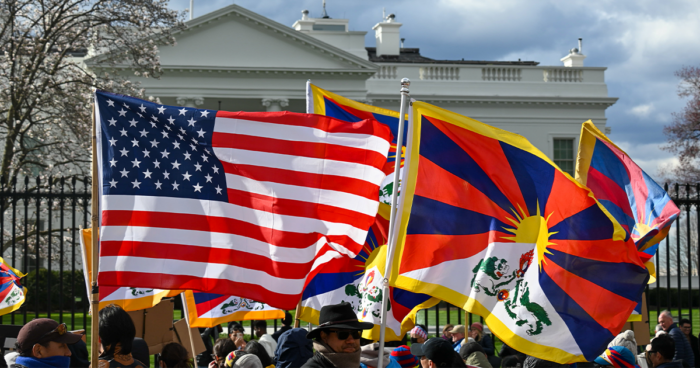
The recently passed US government funding bill provides valuable financial support for the Tibetan people—and pushes back on China’s lies about Tibet and refusal to negotiate with Tibetan leaders.
The bipartisan bill, which Congress passed last week and President Joe Biden signed into law March 23, allocates over $20 million for Tibetan programs, including in the areas of language preservation, environmental protection and Tibetan democracy in exile.
The legislation also says there should be no federal spending on maps or other materials that recognize Tibet as part of the People’s Republic of China until the Chinese government agrees to a negotiated resolution of Tibet’s status.
China has occupied Tibet, a historically independent, neighboring country, for over 65 years. Under China’s rule, Tibet is now one of the least-free places on Earth, with a global freedom score of 0 out of 100, according to the watchdog group Freedom House.
However, a recent wave of US legislation is raising pressure on the Chinese government to peacefully resolve its occupation of Tibet through dialogue with Tibetan leaders.
Franz Matzner, director of government relations at the International Campaign for Tibet, said of the new funding bill: “The United States has once again demonstrated its commitment to the Tibetan people in concrete terms that provide crucial resources for their pursuit of freedom and cultural preservation in the face of the Xi Jinping regime’s escalating oppression.
“For those fighting for survival in Tibet, every dollar counts—and we are grateful for each one. For those outside Tibet, Congress’ investment in maintaining the Tibetan people’s distinct language, religion and way of life provides essential aid and a firm message of hope and solidarity.”
Funding for Tibetan programs
The funding bill provides:
- $10 million for NGOs that have experience working with Tibetan communities to support activities that preserve cultural traditions and promote sustainable development, education and environmental conservation in Tibet.
- $8 million to promote and preserve the Tibetan culture and language in Tibetan refugee and diaspora communities, as well as development and the resilience of Tibetan communities and the Central Tibetan Administration in India and Nepal. This funding will also assist in the education and development of the next generation of Tibetan leaders from those communities.
- $5 million to strengthen the capacity of the Central Tibetan Administration, which provides democratic governance for Tibetans in exile. Up to $1.5 million of this support can be made available to address economic growth and capacity-building activities, including for displaced Tibetan refugee families in India and Nepal.
Resolving Tibet’s status through dialogue
The legislation also addresses China’s attempts to spread disinformation about Tibet and avoid negotiations with Tibetan leaders.
From 2002-10, the Chinese government met for 10 rounds of dialogue with envoys of the Dalai Lama. Since then, China has refused to negotiate in good faith, instead insisting that the Dalai Lama say Tibet has been part of China since ancient times. However, the Tibetan Buddhist leader cannot say that because it isn’t true.
The US government has consistently called on China to get back to the negotiating table without preconditions. The new funding bill adds to those efforts.
The bill forbids spending on documents, reports, maps or other materials that recognize Tibet as part of the People’s Republic of China “until the Secretary of State reports to the appropriate congressional committees that the Government of the PRC has reached a final negotiated agreement on Tibet with the Dalai Lama or his representatives or with democratically-elected leaders of the Tibetan people.”
Growing wave of US legislation
The funding bill builds on a recent wave of bipartisan US legislation that supports the Tibetan people.
In 2018, the US enacted the Reciprocal Access to Tibet Act, which banned Chinese officials from entering the US over their role in keeping American citizens out of Tibet.
Two years later, the Tibetan Policy and Support Act of 2020 dramatically expanded US support for Tibetans and made it official US policy that only the Dalai Lama and the Tibetan Buddhist community can determine his successor, with Chinese officials facing sanctions if they try to interfere in that process.
In February, the House passed the Promoting a Resolution to the Tibet-China Dispute Act, a bipartisan bill that will strengthen US efforts to push China to resolve the status of Tibet through peaceful negotiations with Tibetan leaders.
Earlier this month, two members of the House introduced a bipartisan resolution condemning China’s recent mass arrest of peaceful Tibetan protestors in Derge (Chinese: Dege) county in Tibet and reaffirming the House’s support for Tibetan self-determination.

